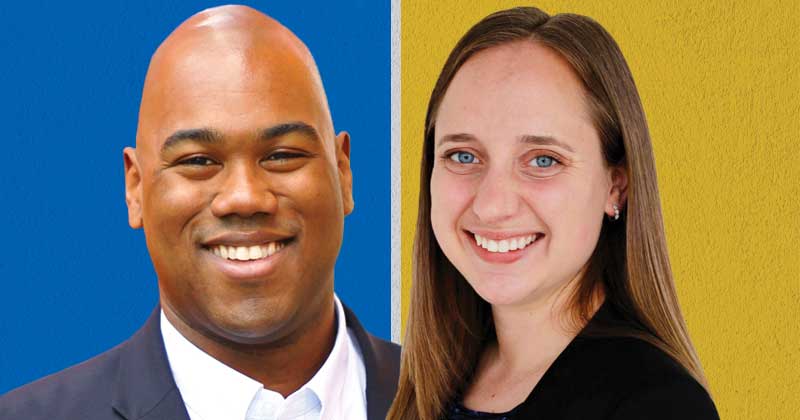New hires joining in 2021 bolster ranks in soft matter, synthetic biology
The University of Delaware Department of Chemical and Biomolecular Engineering will add two new faculty members in 2021: Alexandra Bayles and Kevin Solomon.
“The Department is beyond excited for the opportunity to bring these two talented young engineers to the College of Engineering and campus,” said Eric Furst, Chair of the Department of Chemical and Biomolecular Engineering. “We look forward to their contributions to our esprit de corps, and their contributions to Delaware’s tradition of scholarship, education, and service.”
Alexandra Bayles
Bayles, a postdoctoral research fellow at ETH Zürich in Switzerland, is an expert in soft matter. She is currently pushing the boundaries of fractal processing, a fluidic technique used to structure soft materials.
“The basic idea of fractal processing is to use pressure-driven flows to repeatedly divide, rotate and recombine fluid streams so that you multiply the interfacial contact between different fluids while preserving their spacing and orientation,” she said.
Fractal processing has been used to structure polymeric melts, but Bayles is working on adapting it for complex fluids and gels, which would enable improved control over the internal hierarchy and the characteristic size of products derived from these materials. This work could have applications in a variety of industries, such as food processing and 3D printing.
When she joins UD, Bayles plans to connect with colleagues such as fellow experts in the Center for Research in Soft Matter and Polymers. She is interested in building industry partnerships, developing functional and bio-inspired materials, and building new characterization tools to inform material design.
Bayles is joining UD’s faculty because of the strength of the world-renowned Department of Chemical and Biomolecular Engineering. The department’s reputation also led her to Newark, Delaware back in 2009, when she joined UD as an undergraduate chemical engineering student. She did undergraduate research with Professor (and now-Department-Chair) Eric Furst and parlayed a summer internship with Procter & Gamble into a multi-year collaboration that resulted in two patents.
“UD is special—it is where I first concretely understood how advances in fundamental science facilitate new technology. I am thrilled to be joining a faculty with such expertise, creativity, and innate drive to continue that cycle of innovation,” she said.
After graduating from UD in 2013, Bayles went to the University of California Santa Barbara, where she completed a doctoral degree in chemical engineering as an NSF Graduate Research Fellow in 2018.
Kevin Solomon
Solomon, now an assistant professor at Purdue University, is an expert in systems & synthetic biology and biomanufacturing.
He is working to utilize fungi found naturally in the guts of herbivorous mammals to break down renewable, sustainable materials for use in new biomanufacturing processes. These fungi help animals such as horses, goats and sheep digest tough grasses and could be used in lieu of harsh chemicals or high-temperature processing methods to break down hardy plant material for new uses. Imagine making insulin from grass or gasoline from yard clippings, for example.
“My lab is interested in learning more about these non-model organisms that have this very good chemistry for breaking these things down and then very interested in developing new tools to control them so that we can manipulate them for use,” said Solomon.
When he joins UD, Solomon plans to connect with fellow synthetic biology and biomanufacturing experts and explore opportunities to partner with colleagues at the National Institute for Innovation in Biopharmaceutical Manufacturing and the Chemistry-Biology Interface Program.
Solomon was drawn to UD for its reputation in chemical engineering and found that while the department’s faculty are extremely productive, they are also collaborative and supportive instead of competitive and intense.
“In all my conversations with the faculty, there seems to be a very strong sense of community,” he said.
Solomon received a bachelor’s degree in chemical engineering and bioengineering from McMaster University in Canada in 2006, followed by a master’s degree in chemical engineering practice (2008) and a doctoral degree in chemical engineering (2012) from the Massachusetts Institute of Technology.

